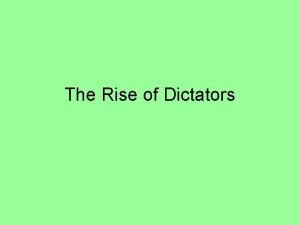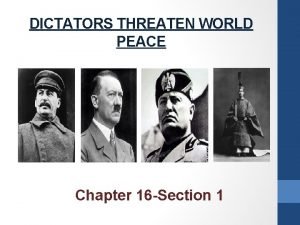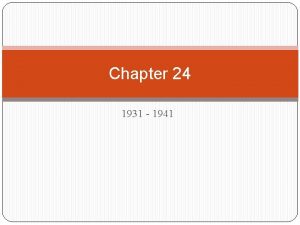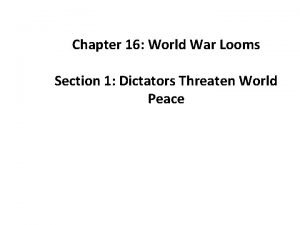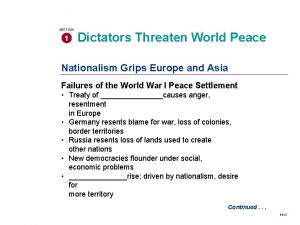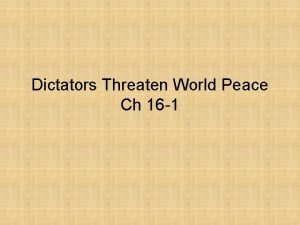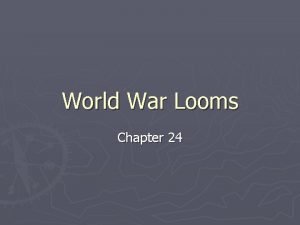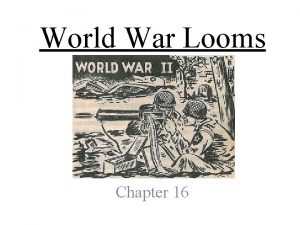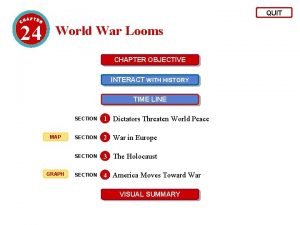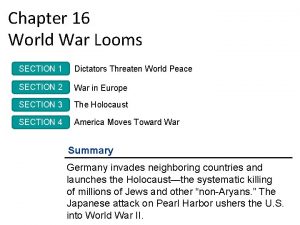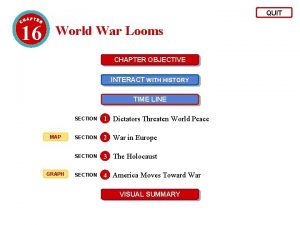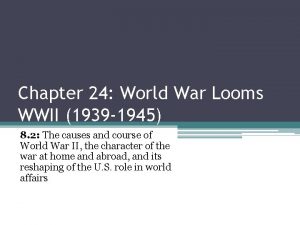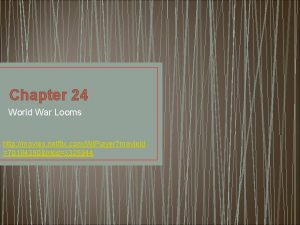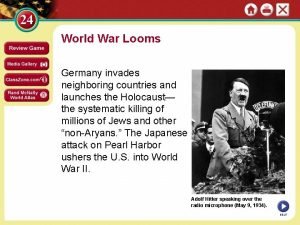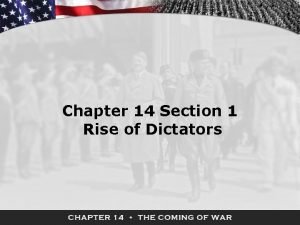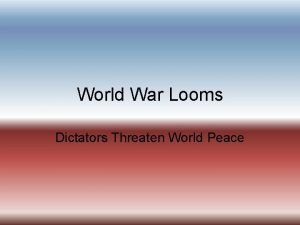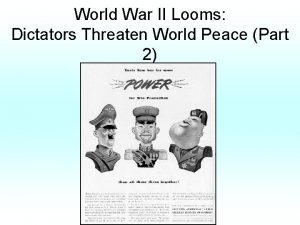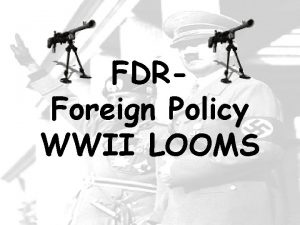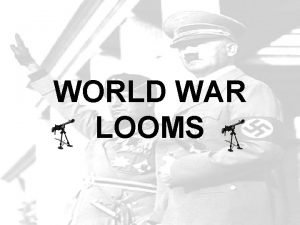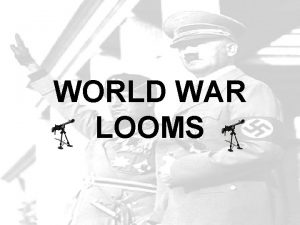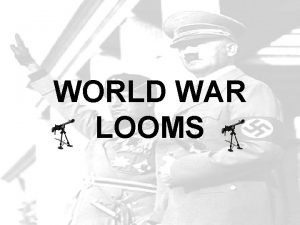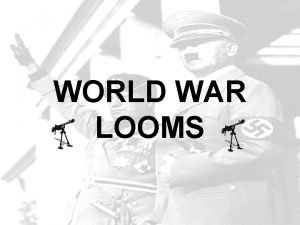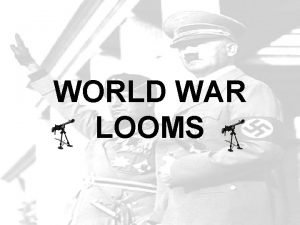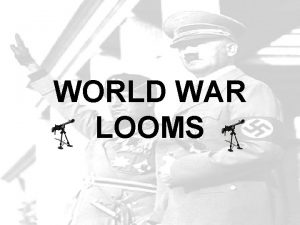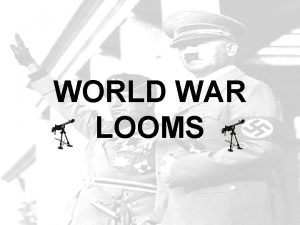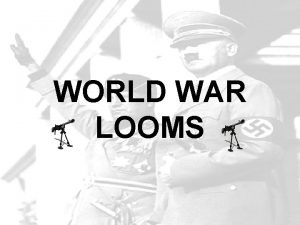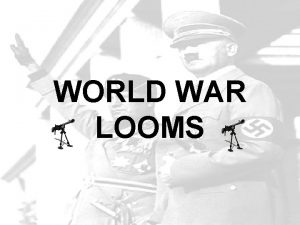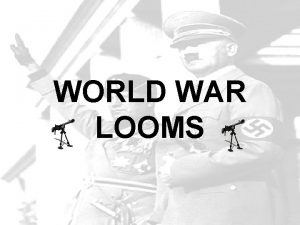World War II Looms Dictators Threaten World Peace















- Slides: 15

World War II Looms: Dictators Threaten World Peace


Joseph Stalin Nation: Soviet Union Political System: Communism Political Philosophy: Aggressive Actions of the 20 s 30 s • Communism should be spread throughout the world by “proletarian” revolutions • Collectivism of agriculture = government controls farms • State ownership of all property • Industrialization of the nation • Eventual rule by the working • The Great Purge = executing all those who oppose the class government (8 – 13 million)

Benito Mussolini Nation: Italy Political System: Fascism Political Movement & Philosophy: • Extreme nationalism and ethnocentrism • Militaristic expansionism • Strong centralized government • Private property & businesses allowed, but under strict government control • Anti-communist Aggressive Actions of the 20 s 30 s • Comes to power through a “March on Rome” • Part of the Rome-Berlin Axis Pact • Aimed to establish an Italian empire in North and East Africa


African Americans Support Ethiopians “We can never forget the help Ethiopia received from Negro Americans during the terrible crisis. . It moved me to know that Americans of African descent did not abandon their embattled brothers, but stood by us. ” (Haile Selassie, Emperor of Ethiopia)

Aggressive Actions of the 20 s-30 s Adolf Hitler • Establishes the Third Reich (dissolves Weimar Republic) Nation: Germany Political System: Nazism Political Movement and Philosophy • Pulls out of the League of Nations • Built up the military (violating Treaty of Versailles) • Sends troops into the Rhineland (the buffer zone between Germany & France/Belgium), Czechoslovakia, and Austria • Forms Rome-Berlin Axis Pact with Mussolini • Extreme nationalism and ethnocentrism • Militaristic expansionism • Authoritarian government • • Private property allowed but strict government controls Passes Nuremburg Laws (revoking Jewish citizenship and enacting “anti -miscegenation” laws) • Orders the “Kristallnacht” and other pogroms (regarded by many as the beginning of the Holocaust) • Invades Poland, 1939 • Anti-communist



Hideki Tojo, Prime Minister of Japan Nation: Japan Political System: Militarist Imperialism Aggressive Actions of the 30 s • Invaded Manchuria (1931) Political Movement and Beliefs: • Extreme nationalism and ethnocentrism • Militaristic and imperialist expansionism • Japan’s destiny is to rule over an empire • Deification of emperor, despite limited power (shogun tradition) – Used the “Mukden Incident” as an excuse to invade – Exploited natural resources – Set up the puppet state of Manchu Guo • Pulled out of the League of Nations (1933) • Invaded China (1937) – Nanjing Massacre (Rape of Nanking)


Francisco Franco Nation: Spain Political System: Fascism Political Movement and Philosophy: • Militarism • Nationalism • Anti-Communist Aggressive Actions of the 20 s and 30 s: • Participated in an uprising against the elected government • Emerged as leader of the Nationalists during the Spanish Civil War • Dissolved the Spanish Parliament

United States Foreign Policy During the 1930 s: A Curious Mix of Isolationism and Interventionism • • • Recognized Soviet Union in 1933 (exchanged ambassadors with Moscow) Continuation of “Good Neighbor Policy” (started under Coolidge and continued by Hoover – focus on non-intervention and repairing relations with Latin American countries) 1934 Reciprocal Trade Agreement Act (gave President Roosevelt more power to make trade agreements with countries and lowered tariffs by 50%) Anti-war sentiment was a strong prevailing belief among large segment of American population. Many opposed it because of hatred for banks and industrialists who had profited enormously from WWI. Made it very difficult for Roosevelt to even support other Western democracies against European and Japanese aggressors, let alone join with others against them. Propaganda served to promote the cause of WW 2 for Americans: https: //www. youtube. com/watch? v=y. BUKRAE 2 O 9 c Carmen Miranda: Unofficial ambassador of the “Good Neighbor Policy: “That Night in Rio” (1941) https: //www. youtube. com/watch? v=KHJLm 6 WNEv 4


Isolationism gives way to a questioning of neutrality… • Americans sympathized with many beleaguered Europeans living under the rule of dictators. Many had already pledged themselves to fight in Spain and East Africa as part of special volunteer battalions • However, many elements of similar racism and oppression existed in the U. S. at the same time (anti-Semitism, racial purity and eugenics theories based on Social Darwinism) • Churchill’s observations of Hitler and his conviction that another world war would be unavoidable finally began to help persuade Americans, through Roosevelt, to throw their weight behind support for the Allied side in the coming war, even if the U. S. declined to become directly involved as a combatant…. . which of course, by December 1941, they inevitably would.
 Types of dictatorship
Types of dictatorship Chapter 16 section 1 dictators threaten world peace
Chapter 16 section 1 dictators threaten world peace World war looms chapter 24
World war looms chapter 24 Dictators threaten world peace
Dictators threaten world peace Dictators threaten world peace chapter 24 section 1 answers
Dictators threaten world peace chapter 24 section 1 answers Dictators threaten world peace
Dictators threaten world peace Chapter 16 section 1 dictators threaten world peace
Chapter 16 section 1 dictators threaten world peace Chapter 16 building vocabulary world war looms
Chapter 16 building vocabulary world war looms Chapter 16 world war looms vocabulary
Chapter 16 world war looms vocabulary Chapter 24 world war looms section 1 answers
Chapter 24 world war looms section 1 answers Chapter 16 building vocabulary world war looms
Chapter 16 building vocabulary world war looms Chapter 16 world war looms answer key
Chapter 16 world war looms answer key Chapter 24 world war looms
Chapter 24 world war looms Chapter 24 world war looms
Chapter 24 world war looms Chapter 24 world war looms
Chapter 24 world war looms Chapter 14 section 2 totalitarianism
Chapter 14 section 2 totalitarianism
